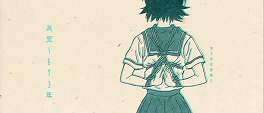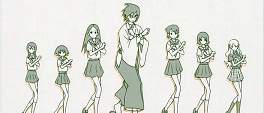How would a studio approach a manga known for its wordplay and focusing on a depressively suicidal teacher, a manga that was notoriously (even infamously) claimed to be untranslatable? Surely even SHAFT, known for their off-the-wall adaptations of other, more straightforward manga such as Pani Poni and Negima, could manage such a feat? They did, and with such reckless disregard for obstacles such as plot, continuity and sanity; Sayonara Zetsubou Sensei is bizarre, satirical, cynical and rambunctious and solidifies SHAFT as a skilled and confident studio.
Describing the premise of the series would never be enough to encapsulate what it is actually about: the histrionically pessimistic Itoshki Nozomu is at thwarted in his attempts to kill himself by the outwardly naive and interminably optimistic Kafuka. This satisfies the first twelve minutes of the series as it then goes on a journey involving stalkers, hikkikomori, escape routes and courting rituals but most of the time it concerns itself with nothing in particular: a multicoloured collage of gags, perceptions on life and randomness. Sayonara Zetsubou Sensei has very little to say and has a damn good time saying it. The series doesn't cover a specific time frame or tell a coherent story, it is a staccato whimsy of wordplay and wonder; a möbius strip of pop-culture references and banter on the thralls of modern existence. If all this sounds like the series occupies a different existence to the rest of the world, you wouldn't be far off the mark. An episode can focus on one specific topic, often meandering along the way, veering off on tangents of logic but ultimately digging through an obscure subject such as what can be accepted as minimal culture, or clearing away impurities or escaping from blame and responsibilities. Other episodes which make up the majority of the twelve episode barrage concern themselves with frittering away on whatever shiny issue takes its fancy, the opening episodes concern themselves with introducing the core set characters and their associated archetypal personality quirks then strobing fanservice, insults, family members and all points in between. Episodes are sometimes over before one knows it, other times the closing animation can be just a punctuation mark before it continues, seemingly unabated.
From a birds-eye view SZS is a muddled, chaotic show with no direction or overall message, but the delights are to be found week by week rather than in a contiguous stream. SHAFT once again take up writing incidental notes on the signs and plethora of blackboards dotted around the backgrounds, the contents of which vary from other anime references to onomatopoeias. At times it seems like the show delights in naughtiness with the bondage packed second opening to the blonde bombshell whose skirt has a propensity for blowing all too frequently in the wind; yet the show is all too aware of itself, sometimes plastering the face of (what one can only assume is) Koji Kumeta on supposedly racy parts and having the aforementioned blonde threaten to sue when her undergarments are inevitably exposed. Given all of this it may be hard to see what allure the series has beyond its bizarreness, yet it is exactly that which makes its examinations of life all the more adroit. Sometimes these can be rapid-fire distractions from the main flow of the episode, other times like the concept of too much evidence or the celebration of innocuous attributes they are the entire premise. Faulting the series inevitably ends in splitting hairs given that each episode is a scatter-shot of styles and content, the speed and veracity of each bite-size skit causes as much humour as the subject matter. All of this is wrapped up in breathtaking aesthetics, never one to be pinned down by one style, SHAFT can sometimes elicit fear and horror as much as it can desire and lust, a remarkable feat given the relative simplicity of the character designs.
Sayonara Zetsubou Sensei revels in the small details, rewarding subsequent viewings and a strong pop-culture knowledge with enough comedy to keep one laughing but never feeling slapstick or belittling. It is peerless in its presentation and wit, and were it not for the training runs the studio seemed to do with Pani Poni Dash and Negima?!, the series would be unique amongst its forebears. While each episode merges into the amorphous idea that is SZS, each concept stands out proudly and memorably and I can think of no other series that is more deserving of a second, than this one. There scant few words that fully encompass the caliber of work on display, but one would be: genius.











